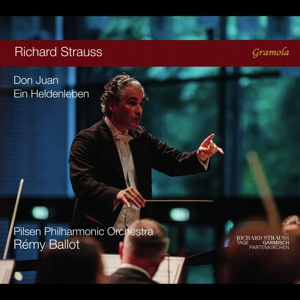
Richard Strauss (1864-1949)
Don Juan, Op. 20
Ein Heldenleben, Op. 40
Pilsen Philharmonic Orchestra/Rémy Ballot
rec. live, 6 June, 2024, Town Hall, Pilsen, Czechia
Gramola 99346 [66]
The notes tell us that despite this recording being under the auspices of the Richard-Strauss-Tage in Garmisch-Partenkirchen (where Strauss lived, in his villa), “[d]ue to better recording conditions, the dress rehearsal and the concert in Pilsen served as [its] basis”.
Rémy Ballot may be best known for his Celibidache-like tempi in performances and recordings from St Florian, issued on the Gramola label, but here we find him tackling two favourite Richard Strauss Tondichtungen – and a glance at their timings indicates that he has not imported into their delivery any such notions regarding unduly leisurely pacing.
The catalogue is of course bulging with highly desirable accounts of these two works, by such as Karajan, Ormandy, Solti et al, and I refer you to my survey of Ein Heldenleben for my top recommendations of Nelsons (live) and Oue (studio). In other words, pretty stiff competition and we must inevitably ask whether we “need” another recording of either.
In short, even if we do, this isn’t it. On first playing, I was instantly underwhelmed by the flabbiness of the “attack” in the opening flourish of Don Juan and the ploggy, rotund sound – over-reverberant and indistinct. Truth to tell, I instantly lost the will to persevere with this recording, yearning to return to the priapic drive generated by Ormandy and Karajan. The last thing Don Juan needs is to sound as if he is in urgent need of those little blue pills. The love music is feelingly played with a nice violin solo but so much detail is lost in the murk of the sound engineering. Ballot his little feeling for the ebb and flow of this music; it just slows down then marginally speeds up apparently randomly – the lethargy of the sequence of woodwind solos starting around 7:50 is dispiriting. Things pick up a bit with the heroic horn call eleven minutes in – in fact, it sounds well in that very open acoustic – but the performance never achieves much momentum. Kudos to the horn players for another valiant excursion starting at seventeen minutes in and there is a certain stately grandeur to the last hoorah before our anti-hero’s demise but it’s not enough to salvage the piece as a whole.
Exactly the same lethargy pervades the opening of “A Hero’s Life” – again, a failing as much the product of the soft-edged sound as the casual conducting. These players need to sound as if they have been energised, galvanised, geared up, but this sounds like a good rehearsal; our hero is on vacation and his adversaries don’t seem to pose much threat. Again, credit is due to a stentorian low brass section and I can enjoy this stirring music in a mediocre rendering such as this but there is no point to it when we are swimming in truly exciting performances of the kind Karajan habitually delivered. As with Don Juan, central to the piece is the love music and the leader again acquits himself very well in the violin solos; as a result, owing to his expertise and sensitivity, “The Hero’s Companion” and the epilogue are by far the most successful sections here, but the percussion in the Battlefield is weak and distant. Compensation again resides in the contribution of the soaring horns and there are sustained passages of considerable beauty and serenity in “The Hero’s Works of Peace”, but the last “movement” lacks tension and overall my response parallels what I feel about the performance of Don Juan: it fails to take off at key points.
I am actually a Ballot fan when it comes to his Bruckner, and I am tolerant and even welcoming of his spacious manner with that composer, but on this evidence, Strauss is not his bag – and even if it were, he is not well served by the venue and engineers here.
Ralph Moore
Buying this recording via a link below generates revenue for MWI, which helps the site remain free.



















